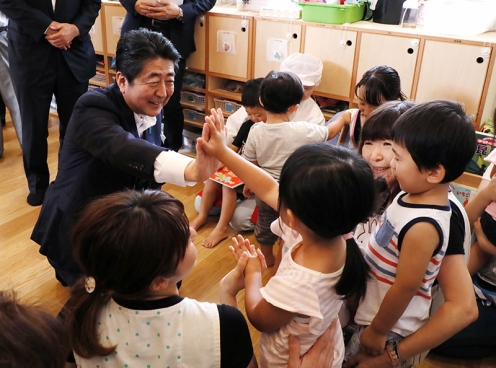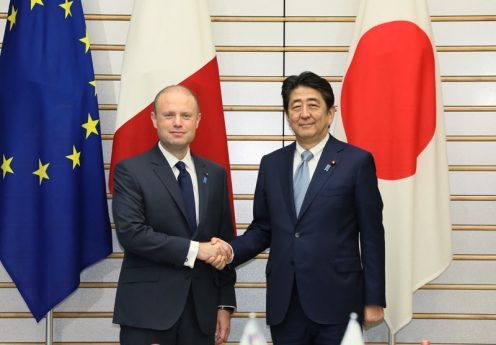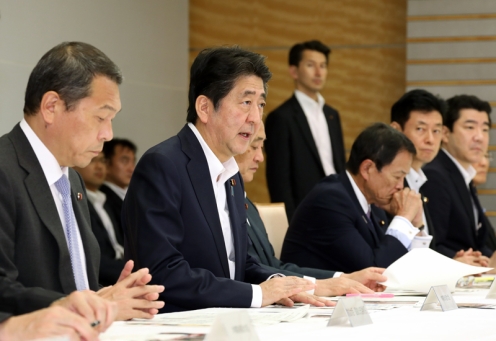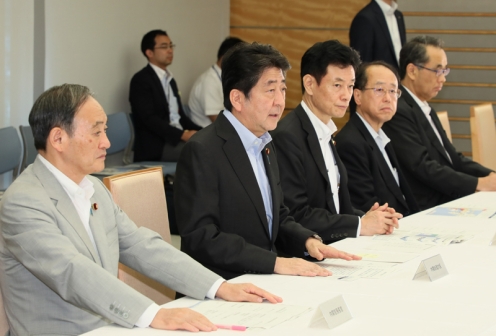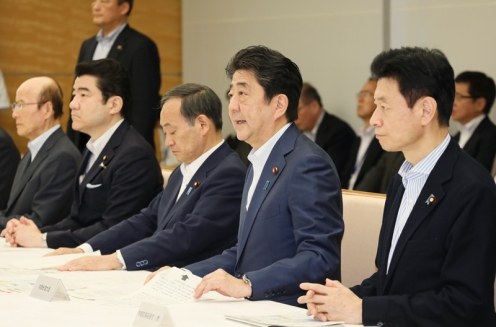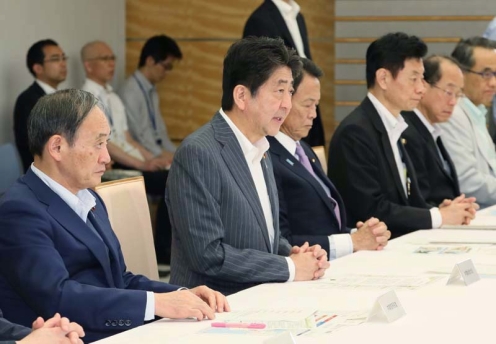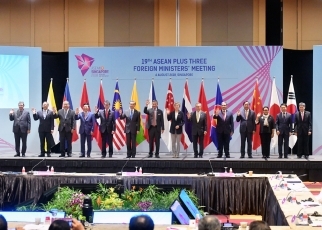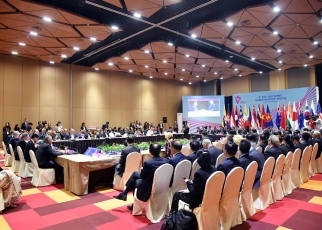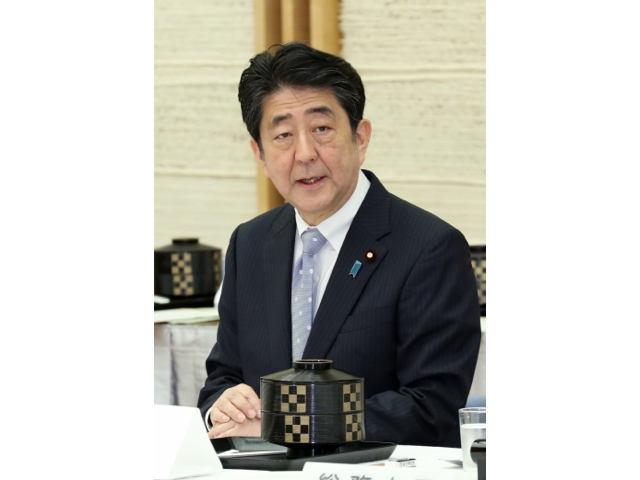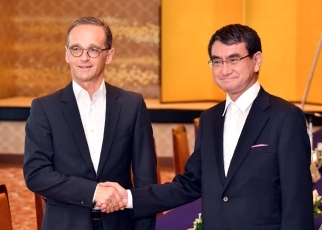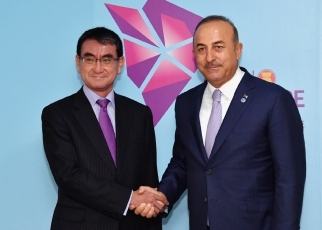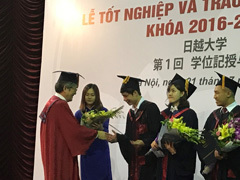Visit to Miyagi Prefecture
Cabinet Secretariat, Thursday, August 2, 2018
[Provisional Translation]
On August 2, 2018, Prime Minister Shinzo Abe visited Miyagi Prefecture.
The Prime Minister visited the retail store and factory of a fishery processing company, industrial learning activities and a childcare center in Ishinomaki City, followed by his attendance to a farewell party organized by Ishinomaki Revival Support Network, a non-profit organization, for people moving out of the No. 7 Minamizakai Temporary Danchi (Housing Complex). Thereafter, the Prime Minister visited Ishinomaki Genki Ichiba.
Afterwards, in Higashi Matsushima City, the Prime Minister visited an agricultural production corporation and then, at Higashi Matsushima City Hall, offered encouragement to support staff sent from other local governments across Japan working there. Later, the Prime Minister offered flowers at the memorial of the Reconstruction Memorial Park of the Great East Japan Earthquake. Following that, the Prime Minister received an explanation about their experiences of the disaster and activities from Ms. Ryo Oyama and Ms. Hikaru Takeyama of Kataribe Group TSUNAGU Teenager Tourguide (TTT).
After his visit, the Prime Minister said,
“Today, I visited Ishinomaki City and Higashi Matsushima City. More than 7 years have passed since the Great East Japan Earthquake, yet there are still many people facing various difficulties.
That being said, reconstruction is proceeding steadily one step at a time.
The fishery processing company and the vegetable farmer I visited today continue to tackle new challenges with great ingenuity, including creating an ideal working environment and improving added value through the utilization of Global G.A.P. They are delivering results and I believe they are a true model for regional revitalization.
The Government will continue offering its full support toward the restoration of ‘nariwai (occupations and livelihoods that sustain people’s daily lives).’
I also paid a visit to a temporary housing unit in Ishinomaki City. We will complete the development of public housing and land for building by the end of this fiscal year. Securing a home is an important and critical first step toward reconstruction. We will exert our full efforts to enable people to finish their lives in temporary housing through the completion of their moves to these new housing during the reconstruction and revitalization period in Miyagi Prefecture and Iwate Prefecture.
The recent heavy rain that struck Western Japan also took many lives and caused tremendous damages across a wide area. Many people are still forced to lead hard lives in evacuation centers full of concern in the extreme heat. After I return to Tokyo, the Government will immediately finish compiling a life ‘nariwai’ rebuilding support package in order to quickly move ahead with rebuilding lives and restoring ‘nariwai’. We will implement this package with a sense of urgency.
Furthermore, we will maintain a necessary level of vigilance and make every effort to prepare for future disasters as the typhoon season is approaching.
The valuable experiences from the Great East Japan Earthquake were greatly utilized for the recent heavy rain event. I hope to expand disaster prevention and disaster reduction measures based on the various lessons learned from past disasters and ceaseless efforts.”
Japan-Malta Summit Meeting and Other Events
Cabinet Secretariat, Wednesday, August 1, 2018
[Provisional Translation]
On August 1, 2018, Prime Minister Shinzo Abe held a summit meeting and other events with H.E. Dr. Joseph Muscat, Prime Minister of the Republic of Malta, at the Prime Minister’s Office.
The two leaders attended a salute and guard of honor ceremony, followed by a summit meeting. Thereafter, the leaders held a joint press announcement.
16th Meeting of the Emergency Response Headquarters for the Heavy Rain in July 2018
Cabinet Secretariat, Thursday, August 2, 2018
[Provisional Translation]
On August 2, 2018, Prime Minister Shinzo Abe held the 16th Meeting of the Emergency Response Headquarters for the Heavy Rain in July 2018 at the Prime Minister’s Office.
The Prime Minister received a written request from Mr. Hidehiko Yuzaki, Governor of Hiroshima Prefecture, Mr. Ryuta Ibaragi, Governor of Okayama Prefecture, and Mr. Tokihiro Nakamura, Governor of Ehime Prefecture.
The Prime Minister said in his address,
“Just now, Governor Yuzaki of Hiroshima Prefecture, Governor Ibaragi of Okayama Prefecture, and Governor Nakamura of Ehime Prefecture gave us a briefing on the damages from the recent heavy rain as well as their requests.
Taking this opportunity, I would like to once again pray for peace for the souls of those who lost their lives in the recent heavy rain and offer my sympathy to everyone who has been affected.
I also want to offer my heartfelt respect for everyone’s hard work in diligently responding to the emergency recovery since the disaster struck, including the three governors.
Almost one month has passed since the disaster, and there are still 11 people missing. We will continue to exert every effort in the search activities. While steady progress is being made with the restoration of infrastructure, such as roads and water service, as well as the disposal of the large amounts of disaster-related waste thanks to the efforts of all those involved, many people living in the affected areas are still being forced to live hard lives as evacuees, full of concern, given the heat wave and extraordinary typhoons.
Particularly, there are serious concerns over the uncertainty with regard to restoring their ‘nariwai (occupations and livelihoods that sustain people’s daily lives).’ I also directly heard from farmers and business owners their moving feelings. The Government is dedicating its full efforts to providing strong support for helping the affected people in the agricultural, forestry and fishery businesses, as well as micro, small and medium-sized enterprises rebuild.
Under the Team to Support the Daily Lives of Disaster Victims, relevant ministries and agencies have shared their knowledge and compile an assistance package for rebuilding lives and restoring ‘nariwai’ in the affected areas.
Using the contingency fund, we will implement these measures at a scale of 100 billion yen.
Specifically, this involves; swift removal of sediment in cities, in particular, financial assistance on par with the Kumamoto Earthquake to dispose of debris; provision of support grants for reconstructing livelihoods of disaster victims to affected households whose homes have been totally destroyed; establishment of reach-out supports including up to three-fourths of subsidies using group subsidies for continuity of business for affected small and medium-sized enterprises; sustained subsidies to broadly support individual businesses; a comprehensive assistance for agricultural, forestry, and fishery businesses to sustain or swiftly resume their businesses, including assistance of 230,000 yen per 10 ares to defray costs related to the replanting of citrus fruit trees; assistance equivalent to 6,000 yen discount per night per person to use for accommodations during the summer vacation season aiming at warding off harmful rumors in the tourism industry. We have compiled these emergency measures, which also thoroughly meet the requests from the governors of three prefectures.
From the standpoint of immediately implementing these measures, the Minister of Finance will spearhead efforts to enable us to allocate a total of 105.8 billion yen from the contingency funds and the Cabinet will approve it tomorrow.
Under this package, we will put various measures, which is necessary, as needed, with a sense of urgency.
The Government exert its fullest efforts to the recovery and reconstruction of the affected areas, working together with affected prefectures and municipalities so that those affected can rebuild their lives, looking ahead with hope for the future, and so affected municipalities can engage in restoration and reconstruction with peace of mind without worrying about their fiscal conditions or budgetary matters. We will implement measures together with all of you that will give people in the affected areas hope for tomorrow. We would like to ask for your continued cooperation and efforts.”
15th Meeting of the Emergency Response Headquarters for the Heavy Rain in July 2018
Cabinet Secretariat, Monday, July 30, 2018
[Provisional Translation]
On July 30, 2018, Prime Minister Shinzo Abe held the 15th meeting of the Emergency Response Headquarters for the Heavy Rain in July 2018 at the Prime Minister’s Office.
Based on the discussion, the Prime Minister said,
“Typhoon No. 12* is currently moving southward over the waters of the western side of Yakushima Island, and some areas of Kyushu are experiencing severe rainfall.
Concerning power outages, which at their peak affected 200,000 homes, it has been fully restored thanks to the power companies’ hard work day and night. I would like to express my gratitude to everyone involved.
Over the course of tomorrow, Typhoon No. 12 is expected to linger near Yakushima, before moving slowly westwards over the East China Sea while gaining its strength. There is concern that western Japan will continue to feel the effects of this typhoon for some time. We must also remain on the alert for severe rainfall, primarily on the Pacific Ocean side and areas around the Tokai region. Please maintain a high level of vigilance even after the typhoon has passed, as river flooding and landslides may occur.
Furthermore, it is expected that we will once again see a prolonged period of intense heat. Please take all possible measures to prevent heatstroke.
As a result of disasters such as the repeated heavy rainfall, heatwaves, and this recent extraordinary typhoon, many people in the disaster-affected areas of western Japan are being forced to live hard lives as evacuees, full of concern. Regarding efforts to secure temporary housing, which will serve as the foundation for rebuilding the lives of everyone affected by these disasters, so far approximately 2,300 applications for moving into public housing and provisional temporary housing have been approved, and 40 ‘constructed’ emergency temporary houses in Hiroshima Prefecture have been commenced along with 170 such houses in Ehime Prefecture.
We will continue to strive to swiftly issue Disaster Victim Certificates and secure housing so that people affected by the disaster can quickly transition away from living at evacuation centers. I would like to ask everyone to do everything in their power, whenever possible, for repair and reconstruction work in the disaster-affected areas, including rebuilding people’s lives and restoring ‘nariwai (occupations and livelihoods that sustain people’s daily lives).’
*Typhoon Jongdari
14th Meeting of the Emergency Response Headquarters for the Heavy Rain in July 2018
Cabinet Secretariat, Sunday, July 29, 2018
[Provisional Translation]
On July 29, 2018, Prime Minister Shinzo Abe held the 14th meeting of the Emergency Response Headquarters for the Heavy Rain in July 2018 at the Prime Minister’s Office.
Based on the discussion, the Prime Minister said,
“At around 1 AM today, Typhoon No. 12* made landfall near Ise City, Mie Prefecture, maintaining a strong force. This has caused heavy rain to fall over a large area of eastern and western Japan, including over 100 millimeters of rain in one hour in Nara Prefecture.
This typhoon has thus far resulted in 21 injured persons in seven prefectures, including Chiba Prefecture, Kanagawa Prefecture, and Shizuoka Prefecture and caused other harm, including damage to houses. I would like to express my heartfelt sympathies to anyone affected. Although we have not, at the current moment in time, confirmed the occurrence of any landslide disasters that would impact people’s homes, we continue to see widespread power outages that, at their peak, have affected 200,000 homes and currently still affect 15,000 homes across 10 prefectures. We are diligently carrying out repair work, with the aim of restoring all power within today.
Typhoon No. 12 will gradually slow down and proceed west. It will likely mainly affect Kyushu in western Japan, for an extended period of time throughout July 30. There is also the concern that we will not see clear weather even after this typhoon passes through Japan, but that localized, heavy rain will continue. We must continue to be on the alert for river flooding and landslides. I ask that everyone does everything they can to respond to the situation, including supporting the evacuation of residents and swiftly restoring lifelines, while striving to ascertain information about the state of the damage, and coordinating closely with municipal governments and other relevant parties.
Many people in the disaster-affected areas of western Japan are being forced to lead hard lives full of concern due to the repeated heavy rains. It is essential that we urgently advance repair and reconstruction work whenever possible in order to prevent the occurrence of secondary disasters. I would like to request that everyone continue to exert their fullest efforts to ensure that those affected can return to their daily lives with peace of mind at the earliest possible date.”
*Typhoon Jongdari
13th Meeting of the Emergency Response Headquarters for the Heavy Rain in July 2018
Cabinet Secretariat, Friday, July 27, 2018
[Provisional Translation]
On July 27, 2018, Prime Minister Shinzo Abe held the 13th meeting of the Emergency Response Headquarters for the Heavy Rain in July 2018 at the Prime Minister’s Office.
Based on the discussion, the Prime Minister said,
“In the areas affected by the disaster, amidst the extreme heat and with the sign of a typhoon approaching, many people are feeling uneasy and anxious while being forced to lead hard lives. The Government will continue to exert all of its efforts towards implementing emergency response and recovery work in these areas, rebuilding the lives of those affected, and restoring ‘nariwai (occupations and livelihoods that sustain people’s daily lives).’
With respect to water supply, thanks to the efforts of all parties involved, Uwajima City and Kawajiri district in Kure City, which sustained particularly heavy damage, are expected to have running water again from early August, ahead of schedule. With regard to securing housing, we already have people set to move into approximately 1,700 private-sector rental housing serving as provisional temporary housing. In addition, the construction of approximately 150 dwellings of ‘constructed’ emergency temporary housing in Ehime Prefecture has been already commenced. In Okayama and Hiroshima Prefectures, preparations including securing of land are under way to begin construction of such dwellings. The Government will continue to provide supports to implement emergency response and recovery work and rebuild the lives of those affected.
Currently, the Team to Support the Daily Lives of Disaster Victims is leading the efforts to urgently compile an assistance package focused on restoring nariwai. We will promptly take the necessary measures, by approving this assistance package by the end of next week, which will include: the swift removal of sediment in cities; assistance that is mindful of the needs of micro, small and medium-sized enterprises using funds such as group subsidies and business sustainability subsidies; assistance for agricultural, forestry and fishery businesses including restoration of irrigation channels for citrus fruits and emergency maintenance of agricultural reservoirs; and measures that will have immediate effect to deal with harmful rumors or misinformation which could affect the tourism industry such as assistance for lodging.
We will exert every effort to support the restoration and reconstruction efforts of the people affected and ensure that the municipalities affected can engage in restoration and reconstruction activities with peace of mind without worrying about fiscal resources.
As for Typhoon No. 12, the surrounding storms have already reached the Ogasawara Islands, and there are concerns over potential damage in various areas. A short while ago, Minister of State for Disaster Management Okonogi convened an Inter-Agency Disaster Alert Meeting and the Government is now on heightened alert. While river restoration work is being carried out at a rapid pace around the clock in the areas affected by the recent heavy rain, it is necessary to be on high alert for river flooding and landslide in these areas where sediment has deposited in rivers due to the past heavy rain and there is loose soil across a large area. I ask that you disseminate information which is easy to understand and surely lead to the evacuation of people as well as provide proactive supports to assist municipalities secure evacuation centers and develop readiness. I also ask the people to stay tuned to the latest weather, disaster, and other information announced by local municipalities and meteorological observatories and be mindful of evacuating early.”
The 19th ASEAN Plus Three Foreign Ministers’ Meeting
Foreign Affairs, Saturday, August 4, 2018
On August 4, from 9:10 a.m. to 10:30 a.m., the ASEAN Plus Three Foreign Ministers Meeting was held in the Republic of Singapore. Foreign Minister Mr. Taro Kono attended the meeting. The overview of the meeting is as follows, with a focus on statements by Minister Kono.
1. Opening remarks
Following the statements by H.E., Dr. Vivian Balakrishnan, Minister for Foreign Affairs of the Republic of Singapore, H.E Mr. Wang Yi, Minister of Foreign Affairs of the Peoples Republic of China and H.E. Ms. Kang Kyung-wha, Minister of Foreign Affairs of the Republic of Korea, Foreign Minister Kono stated the following.
(1) Japan appreciates APT’s contribution to peace, stability and prosperity in East Asia and 21 years of advancing cooperation in areas such as food security, finance, economy, education and public health.
(2) Given the current global situation where protectionism is on the rise in the world, Japan would like to achieve the swift conclusion of the RCEP negotiations for making a comprehensive, balanced, high-quality economic rules.
2. Review of ASEAN Plus Three cooperation and its future direction
Minister Kono stated the following points, mainly on measures taken by Japan on ASEAN Plus Three cooperation.
(1) Japan will contribute to enhance connectivity in the Indo-Pacific region under the Free and Open Indo-Pacific Strategy by extending support for human resources development and quality infrastructure development in accordance with international standards.
(2) Japan has promoted human resources development through the “Industrial Human Resource Development Cooperation Initiative”. Approximately 80,000 people, almost twice as many as the original target, went through the program from 2015 to 2017. Japan will continue to support ASEAN’s efforts to develop quality and skilled workers through the “Innovative Asia Initiative” and “AUN/SEED-NET” program.
(3) Under the Asia Health and Wellbeing Initiative (AHWIN), Japan also aims to bring about a balanced and comprehensive healthcare system in Asia.
(4) Japan will promote people-to-people exchanges and continue sports exchanges as the Tokyo 2020 Olympic and Paralympic Games are now just around the corner.
(5) The recently introduced “JBIC New Facility” will provide support for a variety of infrastructure projects that contribute to global environmental preservation, such as renewable energy projects including wind and geothermal power and smart city.
(6) Climate Change threatens security and economic prosperity in Asia and the world. The “Japan-ASEAN Climate Change Action Agenda” will promote our cooperation in this area.
(7) We appreciate the warm actions, messages and encouragement from your people and government for those who suffered in the heavy rain and flood in July. In light of lessons learned from the past disasters, Japan will work with you to increase the capacity of disaster management and resilience of the Asian society.
(8) The Southeast Asia Disaster Risk Insurance Facility (SEADRIF) will provide financial resilience against natural disasters. SEADRIF is planning to launch a catastrophe risk insurance pool for Lao PDR and Myanmar in the middle of 2019.
(9) The issue of marine litter is now a global concern. We would like to initiate a program with APT members. Japan also intend to take up this issue at the G20 meetings next year.
(10) Japan has been playing a leading role in distributing emergency rice for areas hit by disasters in Southeast Asia under the APTERR agreement.
(11) Over seven years have passed since the Great East Japan Earthquake on March 11, 2011. While many countries have already lifted import restrictions on Japanese foods, some countries are still keeping import bans even now. Japan would like to request to lift such regulations as they are no longer based on scientific evidence.
In response, many countries made statements welcoming the promotion of practical cooperation among the ASEAN Plus Three over the past 21 years, in such fields as finance, economy, food security, poverty alleviation, natural disaster management, people to people connectivity, and tourism.
3. Regional and international affairs
Minister Kono stated the following.
(1) Japan welcomes the Inter-Korean Summit Meeting. It led to North Korea’s commitment toward a “complete denuclearization” which was reaffirmed at the U.S.-North Korea Summit Meeting. I wish to take this opportunity to commend the efforts made by ROK.
(2) I would also like to pay tribute to China for reaching out to North Korea.
(3) The international community must remain unified in keeping the measures based on the relevant United Nations Security Council resolutions.
(4) We seek cooperation for an early resolution of the abductions issue.
In response, many countries raised the issue of North Korea, and stressed the importance of the complete denuclearization of North Korea while welcoming the Inter-Korean Summit and the U.S.-North Korea Summit.
The Eighth East Asia Summit (EAS) Foreign Ministers’ Meeting
Foreign Affairs, Saturday, August 4, 2018
Foreign Minister Mr. Taro Kono attended the 8th East Asia Summit (EAS) Foreign Ministers’ Meeting which was held in Singapore, on August 4 from 11:00 to 13:05 (local time). The overview of the meeting, focusing on Minister Kono’s comments, is as follows.
1. Review of EAS Cooperation and its Future Direction
Minister Kono stressed that EAS has proven itself to be an effective mechanism to tackle issues such as the issue of North Korea, facilitation of maritime cooperation, and promotion of free trade.
A number of the participating countries emphasized the importance to further strengthen the EAS as the premier forum of the region.
2. Exchange of views on regional and international issues
(1) Indo-Pacific
Minister Kono stated that various concepts expressed over the Indo-Pacific such as the “Free and Open Indo-Pacific Strategy” which Japan promotes share the basic principles and made it clear that Japan will give priority to developing“quality infrastructure”for enhancing connectivity across the region, to promoting free trade including through TPP and RCEP; and to taking measures for peace and stability, such as capacity-building of maritime law enforcement and Maritime Domain Awareness (MDA) as well as combating piracy and terrorism.
A number of the participating countries explained their views and concepts on the Indo-Pacific. Reaffirming the commonality of these views and concepts, they expressed their intention to continue discussing the way to deepen coordination among them.
(2) North Korea
Minister Kono commended the efforts by the United States and Republic of Korea (ROK) toward“complete denuclearization”of North Korea. The Minister called for close coordination towards the realization of the goal of complete, verifiable and irreversible dismantlement of all weapons of mass destruction, and ballistic missiles of all ranges by North Korea, in accordance with the relevant United Nations Security Council resolutions (UNSCRs). He emphasized the importance of maintaining and strengthening the efforts to close“loopholes,”including“ship-to-ship transfers.”Furthermore, Minister Kono called on other participating countries to cooperate for the immediate resolution of the abductions issue. In response, almost all of the participating countries raised the issue of North Korea. Most of them stressed the importance of realizing complete denuclearization of North Korea and reiterated that the international community needs to continue implementing the relevant UNSCRs. Some countries expressed their understanding for the immediate resolution of the abductions issue.
(3) Maritime Security
Minister Kono stated that Japan shares with other countries in the region serious concerns over the situation in the South China Sea. He expressed his opposition to attempts to unilaterally change the status quo and stated that such moves may undermine freedom of navigation. He expressed his expectation that efforts such as the Code of Conduct (COC) negotiations will lead to demilitarization of disputed features as well as a peaceful and open South China Sea.
Almost all of the participating countries took up the South China Sea issue and referred to the importance of securing the freedom of navigation and overflight as well as peaceful resolution of conflicts in accordance with the international law including the United Nations Convention on the Law of the Sea (UNCLOS).There were also many countries which expressed serious concern over the recent development on the ground and stressed the importance of non-militarization as well as self-restraint. Moreover, many countries among them referred to the necessity of an effective Code of Conduct (COC).
(4) Others
There were also discussions on counter-terrorism and violent extremism, promotion of free trade and the situation in Rakhine State.
Agreement in principle on the Japan-ASEAN Technical Cooperation Agreement
Foreign Affairs, Thursday, August 2, 2018
On August 2nd, on the occasion of the Japan-ASEAN Foreign Ministers’ Meeting, Foreign Minister Kono and Foreign Ministers of ASEAN Member States confirmed and welcomed that the Government of Japan and ASEAN reached an agreement in principle on the Japan-ASEAN Technical Cooperation Agreement. The Government of Japan and ASEAN will undertake necessary procedures and coordination aiming at the signing of the Agreement at the earliest possible time.
The conclusion of the Agreement will enable the Japan International Cooperation Agency (JICA) to carry out technical cooperation for ASEAN as a unity. While specific cooperation programs will be considered in the future, it is expected that JICA would dispatch its experts to the ASEAN Secretariat in Jakarta in order to create a linkage of and coordinate respective Japan’s ongoing technical cooperation programs in each ASEAN Member State and that JICA would dispatch JICA experts or provide equipment to ASEAN facilities such as the ASEAN Coordinating Centre for Humanitarian Assistance on Disaster Management.
It is expected that such technical cooperation implemented by JICA will promote the enhancement of ASEAN’s unity and centrality, and support the development of the ASEAN Economic Community, and thereby contribute to realization of a free and open Indo-Pacific through the strengthening of connectivity.
Meeting with Chairpersons of Prefectural Assemblies
Cabinet Secretariat, Thursday, July 26, 2018
[Provisional Translation]
On July 26, 2018, Prime Minister Shinzo Abe held a meeting with chairpersons of prefectural assemblies at the Prime Minister’s Office.
The Prime Minister said in his address,
“I would like to thank all of the chairpersons of prefectural assemblies for coming to the Prime Minister’s Office today despite your busy schedules. I appreciate this opportunity to directly listen to the voices of all of you, who are taking the lead and exerting yourself to promote your municipalities.
The earthquake centered in northern Osaka last month followed by the heavy rain event in July 2018 have caused tremendous damages. I would like to once again pray for peace for the souls of those who lost their lives and offer my sympathy to everyone who has been affected.
So far I have visited several areas affected by these disasters in Osaka, Okayama, Ehime, and Hiroshima. The Government will exert every effort towards implementing emergency response and recovery work in these areas, rebuilding the lives of those affected, and restoring ‘nariwai (occupations and livelihoods that sustain people’s daily lives)’ at the earliest day possible, with the intention of doing everything possible. In addition, we will swiftly respond to the issues that have come to light due to these disasters, including measures to protect the safety of children.
Coordinated efforts made between the national and local governments nationwide have been delivering results. For instance, with regard to Disaster Victim Certificates, the certificate issuance process has become more efficient and faster since improvements to allow damage assessments using aerial photos and other means were made in response to the proposal of local governments. Furthermore, under a system which started through the cooperation of the national and local governments nationwide this spring, local governments across Japan are dispatching disaster management coordination supporting personnel as well as over 500 personnel to support affected municipalities. I would like to express my gratitude for such efforts of local governments and ask for your continued engagement.
In the past five years, the Abe Cabinet has continued to take on the challenge of implementing the ‘three arrows’ of Abenomics, which has resulted in economic growth of 11%, a record high. National and local tax revenue also increased by more than 24 trillion yen. Meanwhile, Japan currently faces an unprecedented national crisis, namely, the rapidly declining birthrate and aging population. To overcome this difficulty and further enrich the lives of the people, I am determined to take on the revolutions in productivity and human resources development much like two wheels of a cart. It is precisely the local economies that will drive Japan’s growth. Exports of agricultural, forestry and fishery produce have broken the record in five consecutive years. The number of foreign visitors to Japan in the first half of this year is approaching 16 million, and we are now in an era of having 30 million visitors a year. We will also further accelerate the pace of regional revitalization by swiftly implementing the policy package compiled last month.
It is the basic policy of the Abe Cabinet to listen closely to the voices of local communities.
I look forward to hearing your frank opinions at today’s meeting. Thank you for your cooperation.”
Japan-Germany Foreign Ministers’ Meeting and Working Lunch
Foreign Affairs, Wednesday, July 25, 2018
On July 25, commencing at 12:05 p.m. for approximately two hours, Mr. Taro Kono, Minister for Foreign Affairs, held a foreign ministers’ meeting with H.E. Mr. Heiko Maas, Federal Minister for Foreign Affairs, Federal Republic of Germany, who was visiting Japan. The overview of the meeting is as follows.
1. Beginning
Minister Kono welcomed Minister Maas on his first visit to Japan, and stated that Japan and Germany are important partners that lead Asia and Europe respectively, and which address the various problems facing the international community based on common fundamental values. Minister Kono explained that he intends to coordinate more closely with Germany, which will serve as a non-permanent member of the United Nations Security Council (UNSC) for a two-year period from next year.
In response, Minister Maas offered words of condolence regarding the heavy rain disaster in western Japan, and stated that Germany and Japan are important partners which share values. Minister Maas explained that he selected Japan as the first country in his first round of visits to Asia as Foreign Minister. Minister Maas stated that he hopes Japan and Germany will cooperate closely for purposes such as free trade, maintaining the rule-based international order, and multilateral cooperation.
2. Bilateral relations
(1) The two ministers confirmed that on the basis of the joint statement issued on this occasion, they will deepen cooperation and dialogue on challenges in the international arena such as UNSC reform, disarmament and non-proliferation and disarmament, as well as regional situations in Asia, the Middle East and elsewhere.
(2) The two ministers shared the view that they will explore the establishment of a new framework for discussion by their foreign affairs and defense ministries, toward strengthening Japan-Germany cooperation in the security field.
(3) The two ministers welcomed that commemorative events relating to DAIKU2018, which celebrates the 100th anniversary of the first performance in Japan of Ludwig van Beethoven’s Symphony No. 9 this year, are being held with great success in both Japan and Germany.
3. Japan-European Union (EU) relations
(1) Minister Kono stated that Japan supports a strongly united Europe, and the two ministers shared the view that they will set up a dialogue between the two countries’ Ambassadors or Director-Generals in charge of the Western Balkans, in order to pursue Japan-Germany collaboration on the Western Balkans, which aims to join the EU.
(2) The two ministers welcomed the signing of the Japan-EU Economic Partnership Agreement (EPA) and Strategic Partnership Agreement (SPA) on July 17, and confirmed that they will continue to work together in order to bring both agreements into force promptly.
4. Cooperation in the international arena.
(1) The two ministers shared the view that they will pursue G4 initiatives on UNSC reform.
(2) They confirmed that they will coordinate toward realizing “a world free of nuclear weapons” through frameworks such as the Non-Proliferation and Disarmament Initiative (NPDI).
5. Regional situations
(1) With regard to North Korea, the two ministers shared the view that it remains to be necessary for North Korea to dismantle all weapons of mass destruction and ballistic missiles of all ranges in a complete, verifiable and irreversible manner, and that Japan and Germany will work together toward the full implementation of UNSC resolutions.
(2) In addition, the two ministers also exchanged views on the Middle East situation, the situation in Europe, maritime security and other issues.
Japan-Turkey Foreign Ministers’ Meeting
Foreign Affairs, Thursday, August 2, 2018
On August 2, commencing at 10 a.m. (local time; 11 a.m. on August 2, Japan time) for approximately 30 minutes, Mr. Taro Kono, Minister for Foreign Affairs, who is visiting Singapore to attend ASEAN-related Foreign Ministers’ Meetings, held a Japan-Turkey Foreign Ministers’ Meeting with Mr. Mevlüt Çavuşoğlu, Minister of Foreign Affairs of the Republic of Turkey. The overview of the meeting is as follows.
1. Bilateral relations
Minister Kono congratulated Minister Çavuşoğlu on his reappointment as Minister of Foreign Affairs, and stated that he is looking forward to working together in order to further develop the bilateral relationship. In response, Minister Çavuşoğlu thanked Minister Kono for his congratulations, and expressed the desire to further develop the Japan-Turkey relationship, including high-level exchanges.
Furthermore, the two ministers exchanged views on bilateral cooperation such as accelerating negotiations on the Japan-Turkey Economic Partnership Agreement (EPA), promoting cooperation relating to the Turkish-Japanese Science and Technology University, and strengthening cooperation in the field of disaster prevention.
2. Regional affairs
In addition, the two ministers exchanged views on the situation in the Middle East, such as Syria and Iran, as well as in North Korea, and shared the view that they will continue to work closely together.
Minutes of the Monetary Policy Meeting on June 14 and 15, 2018
Bank of Japan, Friday, August 3, 2018
A Monetary Policy Meeting of the Bank of Japan Policy Board was held in the Head Office of the Bank of Japan in Tokyo on Thursday, June 14, 2018, from 2:00 p.m. to 3:32 p.m., and on Friday, June 15, from 9:00 a.m. to 11:34 a.m.
Outlook for Economic Activity and Prices (July 2018, The Bank's View)
Economy, Tuesday, July 31, 2018
Japan's economy is likely to continue growing at a pace above its potential in fiscal 2018, mainly against the background of highly accommodative financial conditions and the underpinnings through government spending, with overseas economies continuing to grow firmly. From fiscal 2019 through fiscal 2020, the economy is expected to continue on an expanding trend, partly supported by external demand, although the growth pace is projected to decelerate due to a cyclical slowdown in business fixed investment and the effects of the scheduled consumption tax hike.2
The year-on-year rate of change in the consumer price index (CPI, all items less fresh food) has been positive but has continued to show relatively weak developments compared to the economic expansion and the labor market tightening. Reflecting such developments, a rise in medium- to long-term inflation expectations has been lagging behind.
It has been taking time for the inflation rate to rise compared to an improvement in the economic and employment conditions because the mindset and behavior based on the assumption that wages and prices will not increase easily have been deeply entrenched, due mainly to the experience of prolonged low growth and deflation. Under these circumstances, firms' cautious wage- and price-setting stance as well as households' cautiousness toward price rises have not yet clearly changed, and downward pressure on prices stemming from intensifying competition has been strong in some areas. The large room for firms to raise productivity, as well as technological progress in recent years, are some other contributing factors to these developments.
Nonetheless, with the output gap remaining positive, firms' stance gradually will shift toward further raising wages and prices and households' tolerance of price rises will increase. In this situation, further price rises are likely to be observed widely and then medium- to long-term inflation expectations are projected to rise gradually. As a consequence, the year-on-year rate of change in the CPI is likely to increase gradually toward 2 percent, although it will take more time than expected.
Comparing the current projections with the previous ones, the projected growth rates are more or less unchanged and the projected rates of increase in the CPI are lower.
With regard to the risk balance, upside and downside risks to economic activity are generally balanced in fiscal 2018, but risks are skewed to the downside for fiscal 2019 onward. Risks to prices are skewed to the downside. On the price front, the momentum toward achieving the price stability target of 2 percent is maintained but is not yet sufficiently firm, and thus developments in prices continue to warrant careful attention.
Strengthening the Framework for Continuous Powerful Monetary Easing
Bank of Japan, Tuesday, July 31, 2018
July 31, 2018 Bank of Japan
Strengthening the Framework for Continuous Powerful Monetary Easing
1. At the Monetary Policy Meeting (MPM) held today, with a view to persistently continuing with powerful monetary easing, the Policy Board of the Bank of Japan decided to strengthen its commitment to achieving the price stability target by introducing forward guidance for policy rates, and to enhance the sustainability of "Quantitative and Qualitative Monetary Easing (QQE) with Yield Curve Control."
(1) Forward guidance for policy rates [Note 1]
The Bank intends to maintain the current extremely low levels of short- and long-term interest rates for an extended period of time, taking into account uncertainties regarding economic activity and prices including the effects of the consumption tax hike scheduled to take place in October 2019.
(2) Yield curve control
The Bank decided, by a 7-2 majority vote, to set the following guideline for market operations for the intermeeting period. [Note 2]
The short-term policy interest rate:
The Bank will apply a negative interest rate of minus 0.1 percent to the Policy-Rate
Balances in current accounts held by financial institutions at the Bank.
The long-term interest rate:
The Bank will purchase Japanese government bonds (JGBs) so that 10-year JGB
yields will remain at around zero percent. While doing so, the yields may move upward and downward to some extent mainly depending on developments in economic activity and prices.1 With regard to the amount of JGBs to be purchased, the Bank will conduct purchases in a flexible manner so that their amount outstanding will increase at an annual pace of about 80 trillion yen.
(3) Guidelines for asset purchases
With regard to asset purchases other than JGB purchases, the Bank decided, by a unanimous vote, to set the following guidelines.
a) The Bank will purchase exchange-traded funds (ETFs) and Japan real estate investment trusts (J-REITs) so that their amounts outstanding will increase at annual paces of about 6 trillion yen and about 90 billion yen, respectively. With a view to lowering risk premia of asset prices in an appropriate manner, the Bank may increase or decrease the amount of purchases depending on market conditions.2
b) As for CP and corporate bonds, the Bank will maintain their amounts outstanding at about 2.2 trillion yen and about 3.2 trillion yen, respectively.
2. In addition, the Bank decided to make the following adjustments in accordance with the measures described above.
a) Change in the size of the Policy-Rate Balance
The Bank, under the condition that yield curve control can be conducted appropriately, will reduce the size of the Policy-Rate Balance in financial institutions' current account balances at the Bank -- to which a negative interest rate is applied -- from the current level of about 10 trillion yen on average. This Balance is calculated assuming that arbitrage transactions take place in full among financial institutions.
b) Change in the amount of each ETF to be purchased
The Bank will revise the purchase amount of each ETF and increase that of ETFs which track the Tokyo Stock Price Index (TOPIX).
3. Japan's economy is expanding moderately, with a virtuous cycle from income to spending operating, and labor market conditions have continued to tighten steadily. Meanwhile, prices have continued to show relatively weak developments compared to the economic and employment conditions. As shown in the July 2018 Outlook for Economic Activity and Prices (Outlook Report) released today, this is attributable to a combination of factors such as firms' cautious wage- and price-setting stance and households' continuous cautiousness toward price rises, and it is likely to take more time than expected to achieve the price stability target of 2 percent. However, the year-on-year rate of change in the consumer price index (CPI) is likely to increase gradually toward 2 percent with the output gap remaining positive.
4. Based on the above recognition, the Bank judged it appropriate to introduce forward guidance for policy rates and to enhance the sustainability of "QQE with Yield Curve Control" by conducting market operations as well as asset purchases in a more flexible manner, thereby maintaining the output gap as long as possible within positive territory. The Bank recognizes that this will lead to achieving the price stability target of 2 percent at the earliest possible time, while securing stability in economic and financial conditions.
5. The Bank will continue with "QQE with Yield Curve Control," aiming to achieve the price stability target of 2 percent, as long as it is necessary for maintaining that target in a stable manner. It will continue expanding the monetary base until the year-on-year rate of increase in the observed CPI (all items less fresh food) exceeds 2 percent and stays above the target in a stable manner. The Bank will examine the risks considered most relevant to the conduct of monetary policy and make policy adjustments as appropriate, taking account of developments in economic activity and prices as well as financial conditions, with a view to maintaining the momentum toward achieving the price stability target.
[Note 1] Mr. Y. Harada dissented, considering that it was appropriate to introduce forward guidance that would further clarify its relationship with the price stability target. With a view to achieving the price stability target of 2 percent at the earliest possible time, Mr. G. Kataoka dissented, considering that it was appropriate for the Bank to make a commitment to taking additional easing measures if it revised downward its assessment of medium- to long-term inflation expectations, rather than to make the commitment to maintaining the levels of short- and long-term interest rates.
[Note 2] Voting for the action: Mr. H. Kuroda, Mr. M. Amamiya, Mr. M. Wakatabe, Mr. Y. Funo, Mr. M. Sakurai, Ms. T. Masai, and Mr. H. Suzuki. Voting against the action: Mr. Y. Harada and Mr. G. Kataoka. Mr. Y. Harada dissented, considering that allowing the long-term yields to move upward and downward to some extent was too ambiguous as the guideline for market operations decided by the Policy Board. Mr. G. Kataoka dissented, considering that (1) taking account of the current sluggishness in prices and risk factors going forward, it was desirable to strengthen monetary easing so that yields on JGBs with maturities of 10 years and longer would broadly be lowered further, and (2) controlling the long-term yields in a flexible manner would make their target level of around zero percent unclear.
1 In case of a rapid increase in the yields, the Bank will purchase JGBs promptly and appropriately.
2 The Bank will continue purchasing ETFs composed of stocks issued by firms that are proactively investing in physical and human capital at an annual pace of about 300 billion yen, as decided at the MPM held in December 2015.
Relaxation of Visa Requirements for Nationals of the Republic of the Philippines
Foreign Affairs, Tuesday, July 31, 2018
1. Based on the "Tourism Vision Realization Program 2018" (Action Program for Realization of Tourism Vision 2018), in order to promote people-to-people exchanges between Japan and the Republic of the Philippines, the relaxation of visa requirements for short-term stay for nationals of the Philippines was decided and will come into effect on August 1, 2018.
2. The specific measures to be taken are as follows:
(1) The scope of applicants eligible for multiple entry visas for short-term stay with business purposes and for cultural and intellectual figures will be expanded.
(2) The validity period of the visas will be extended from 5 years to 10 years maximum.
3. The abovementioned relaxation of visa requirements is expected to contribute to improvement of convenience for tourists and increase in repeat visitors as well as further advancement of people-to-people exchanges between Japan and the Republic of the Philippines.
(Note) More details including outline of application procedures for multiple entry visa will be announced later on the website of Ministry of Foreign Affairs.
First Commencement Held at Vietnam Japan University
JICA, Wednesday, August 1, 2018
The 56 students in the first graduating class completed one of six master degree programs (area studies, business administration, environmental engineering, infrastructure engineering, nanotechnology and public policy) over a two-year period, and were conferred their degrees by Motoo Furuta, VJU Rector.
The event was attended by university officials and representatives from Japanese corporations with operations in Vietnam. Included in the guest roster of university dignitaries were Tsutomu Takebe (Special Advisor to the Japan-Vietnam Parliamentarians’ Friendship League and Trustee of VJU), Katsuichi Uchida (Senior Advisor to Waseda University and Vice-Chairman of the board of trustees of VJU) and Kunio Umeda (Ambassador Extraordinary and Plenipotentiary of Japan to Vietnam and Trustee of VJU). Other university dignitaries included Nguyen Kim Son (President of Vietnam National University, Hanoi, and Chairman of the board of trustees of VJU) and To Huy Rua (Chairman of Vietnam-Japan Friendship Association and VJU Honorary Rector).
In his congratulatory address to the graduates, Furuta emphasized that when advancing sustainable social development, it is critical to seek a balance between humans and nature, between short-term and long-term objectives, between the present and the future, and between the interests of individuals and those of society. He also encouraged the students to exemplify the spirit and cultural values of both Japan and Vietnam as representatives of the friendship between both countries that VJU symbolizes.
Among this initial class of graduates were many whose paths are set to move forward with a move to Japan in September in response to offers for employment at the main offices of Japanese companies and matriculation to doctoral courses at Japanese universities. Many others had found employment at Japanese operations in Viet Nam, and it is expected that they will lead advances in industry and technology as bridges in the Japan-Viet Nam relationship.
JICA will continue to provide support in various forms for the development of VJU.

























